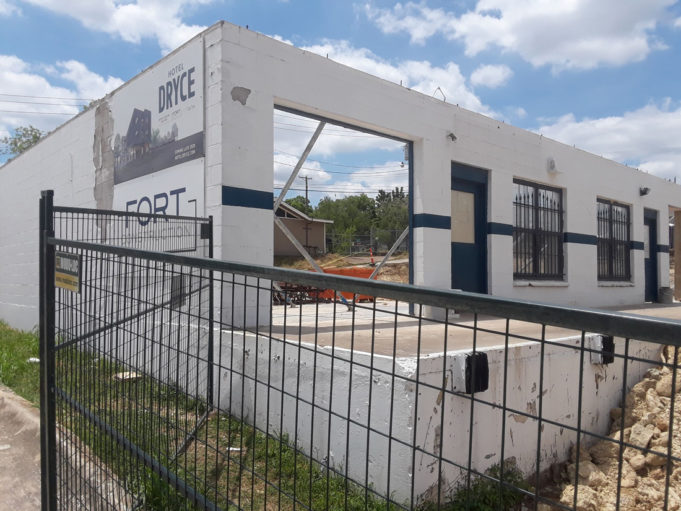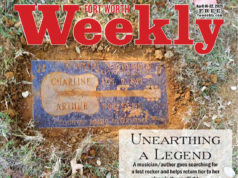Jason Suder was in a celebratory mood when I sat down to talk with him about his upcoming music venue. I was a little happy, too. The appeal of hanging out with other human beings in the real world can never be underestimated.
After grabbing some choice bombers of beer from Southside Cellar, we drove to Tulips. Suder and his crew have largely cleared out the 5,000-square-foot space — no small feat considering the densely packed brewing equipment and barrels left behind by the previous tenant, the now-defunct Collective Brewing Project. As we sat on a picnic bench near the bar, Suder got to the point.
“It’s a dichotomy,” he said. “On one hand, I’m opening a business that is exclusively about gathering and congregating in public while dancing, sweating, hugging, and laughing. On the other hand, I am concerned about how I will safely open my business. We are working through [safety protocols] at the national level with the National Independent Venue Association. The health and safety of our patrons are paramount. We are a secular sanctuary.”
Everyone in the music industry is trying to stay as optimistic as possible, he added.
The live music industry was one of the first casualties of COVID-19, and it will be one of the last to recover. According to the Los Angeles Times and other prominent publications, packed music venues and outdoor concerts without social distancing rules are probably 18 months off.
How do you run a music venue when you can fill your space only to 25% or 50% of your stated occupancy? Suder has a few ideas. When Tulips opens this summer, he said, it may have more of a bar-bar feel.
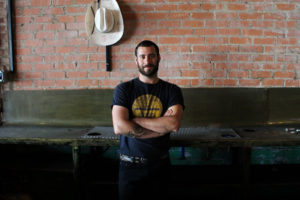
Photo by Edward Brown
Suder and Fort Worth’s bar proprietors recently heard welcome news from Gov. Greg Abbott. Bars and craft breweries can open at 25% occupancy on Friday, according to the governor’s Phase Two to Open Texas. Bar and brewery patios and outdoor spaces are not subject to occupancy limits as long as “safe distances” are maintained between parties. Restaurant occupancy can increase to 50% on Friday.
“I am concerned for bar owners who can take their employees off unemployment,” Suder said. “People can start coming out again and dipping their toes in social events. I’m also concerned about the safety with which we can open and provide sanitary establishments that ensure health, especially if we’re all getting drunk.”
There’s no right or wrong answers for bar owners who are navigating questions about how or if to open, he added. Suder acknowledged that his late summer opening gives him breathing room to assess the situation that other bar proprietors don’t have. (See: HearSay, pg. 20.)
“At the same time, that means that I have to watch my fellow bar proprietors being put to that test,” he added.
Suder wasn’t quite ready to announce his choice for taproom manager, but he said she is well known in the local bartending community as a “badass.” She will be overseeing 18 beer drafts, a wide cocktail selection, and several frozen drinks. When Tulips does open, the bar will only use disposable cups to lower the risk of spreading COVID-19.
The Near Southside venue will also have a robust coffee program to draw in the late-morning crowd, he added. If packed music halls are verboten this summer (which they likely will be), Tulips may keep the music component alive via speakers that wash tunes over outdoor patrons who are waiting their turn to come inside.
Simultaneously livestreaming shows may also help cover the spread, financially speaking, he said. Livestreamed music shows have become the default mode of consuming live music for Americans these past two months. Even when in-person performances slowly make their way back into our lives, Suder sees an important place for remote viewers.
“I’ve been adamant about livestreaming from the beginning,” he said. “I’m not going to pay in-person prices to watch a show on the computer. What is it worth to somebody? If you spend $5 or $10 to watch an online show, that’s our ability to pay our staff or the musicians.”
The basic layout of Tulips hasn’t changed since our last chat (“ Tulips Arrives,” March 4). As patrons walk in from the main entrance that faces St. Louis Avenue, they will see a ticket booth to their right and a lounge/bar area to their left. Partitioning the length of the space will be moveable walls that can open for concerts or close to give the bar a cozier feel. The main stage will occupy the far end of the venue near the back patio. Suder and business partner Matthew Harber are deciding if the main stage needs all the finishing bells and whistles or something a little simpler for the first months after Tulips’ opening.
Suder’s emotions vacillated between stark and elated as we chatted. He feels the weight of a music industry that has taken a two-month pummeling and still has more than its fair share of blows to come.
“We have to pay rent in July,” he said. “These things don’t stop just because there is a pandemic. What if we open and there is a second wave of this? What if we aren’t allowed to open up at all? We have these concerns while we are worrying about being on the proper timeline to turn revenue while staying within budget.”
The Fort Worth native and first-time entrepreneur then flipped the narrative.
“That’s me being candid, but, in reality, I’m optimistic,” he said. “It’s incumbent upon me to be creative to make sure that, come hell or high water, I can offer Tulips to Fort Worth and the rest of the world.
“The music is never going to die,” he continued. “I have to make sure that this cultural imperative stays afloat.”
Update: Tulips recently announced its grand opening weekend that will feature Band of Heathens on August 21.
*******
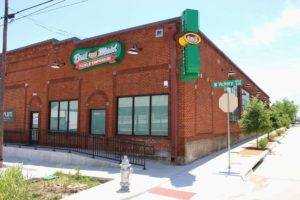
Photo by Edward Brown
The Best Maid Pickles marketing director said that her company spent around a year trying to find the perfect location to build a space where pickle fanatics can meet and interact with the iconic pickle brand. The current production and bottling site (just outside the Near Southside on East Vickery Boulevard), with its heavy equipment, simply isn’t conducive to visitors, she said.
The pickle emporium, she said, will fill four roles: event space, learning center, museum, and retail store. Relics from the company will be the main draw, along with hard-to-find Best Maid products like the Spicy Bloody Mary Pickles.
The Fort Worth business is still riding high on the insanely popular collaboration with Martin House Brewing Company. “Pickle beer” entered the national vernacular last year when the Riverside brewery canned what is basically fermented pickle juice. Shelves of the sour beer were cleared in a day. When the Pickle Emporium does open, locals can expect pickle beer to be the adult beverage of choice at the grand opening.
Christy said online retail sales have been surprisingly strong. During tough times, consumers often turn to familiar, comforting food items. To support local restaurants while giving employees a cooking-free evening, Christy said Best Maid orders to-go dinners for all of its nearly 100 employees once a week.
Opening the Pickle Emporium during an economic downturn when there are public health considerations to be managed has been “a little nerve-racking,” she said.
Opening the Pickle Emporium has “been in the works for at least a year,” she said. “We are looking at this in the long term. We signed a seven-year lease. We plan to be a part of [the Near Southside community]. We can’t wait to have a celebration while following social distancing guidelines.”
********
Jonathan Morris was in Argentina visiting family last March when the Argentinian government issued the order for all visitors to self-quarantine. Just one week earlier, Morris had broken ground at Hotel Dryce, the boutique hotel that sits across Montgomery Street from Dickies Arena.
“I was coming off a lot of energy and excitement,” he said. “One week later, that’s when closures started to happen. I’m thinking to myself, ‘What will this mean for construction?’ ”
Morris may be better known locally as the proprietor of Fort Worth Barber Shop. It would be nearly one month before Morris was able to return to Fort Worth to oversee his two businesses.
Early on, while still in Buenos Aires, he made the call to temporarily close his barbershop.
“It sucked,” he said. “Having a team of people who are out of work and not knowing for how long, that was definitely anxiety-inducing.”
No business owner wants to shutter a profitable operation, he said, but that decision would have been made by county officials if Morris didn’t. The situation still left the viability of continuing construction in jeopardy. Construction projects that started before the outbreak are considered essential under the shelter-in-place order, according to past statements by city officials.
“Thus far, we have been able to continue with construction,” Morris said. “The job site enforces social distancing. They are working to stay within the timeline” to open in December.
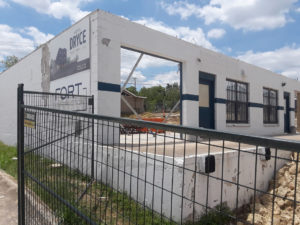
Photo by Edward Brown
Morris said he has always been a fan of boutique hotels. A mid-2018 conversation with his friend and Hotel Dryse business partner, Allen Mederos, led to the current hotel project. Hotel Dryse will allow Fort Worth to attract tourists who are looking for something unique and experiential when they check in.
Opening by December is something of an imperative for the boutique hotel, Morris said. That month will give the team time to train and prepare for a potential deluge of visitors as the Fort Worth Stock Show & Rodeo ramps up in January. If there is a rodeo.
“We don’t know what the travel industry will look like in eight months,” he said. “We are remaining optimistic that travel comes back and people are wanting to discover our city.”
Last Friday, hair salons and barbershops were given the green light to open if they followed state-mandated guidelines. Morris said it’s too early to announce when Fort Worth Barber Shop will reopen.
“We plan on opening pretty soon,” Morris said. “We are holding off so that, when we open, we are doing so as safely as possible.”
Morris said he has reached out to UNT Health Science Center for guidance on safety protocols.
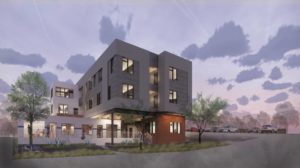
Courtesy of Bennett Benner Partners Architects + Planners
“The proximity of our staff to people will be the closest that [our barbers] have been to people in two months,” he said. “I think the medical world is the first place to look to for guidance. Doctors and nurses are working in close proximity to their patients. Your barber may end up looking like hospital staff.”
Morris said his employees are both eager to start work again and apprehensive about keeping customers and themselves healthy. Many Fort Worth Barber Shop clients have voiced support on social media for Morris’ cautious approach to reopening. There’s also a contingent of clients who wanted their haircuts yesterday, Morris added.
“For entrepreneurs, this is one of the most difficult times that many of us have had to deal with,” Morris said. “Nobody has the silver bullet answer. I think it is important that the public understands that we are figuring this out day by day and we are doing our best to take care of people.”
Morris said he is looking forward to putting money in the hands of his barbers, many of whom work as independent contractors.
Like Suder and countless other small business owners across Fort Worth, Morris is using the same leadership skills and out-of-the-box thinking that he has honed as an entrepreneur to tackle the COVID-19 problem.
“Entrepreneurs are problem solvers,” Morris said. “There is no playbook or road map as to what that looks like. I am going with my gut in terms of trying to make the best decisions for my staff and for the health of our business. Those decisions are tough. As a leader, like it or not, we [small business owners] have to lead. We will never appease everyone. Not everyone will be happy.
So long as you are guided by a moral compass that is unselfish and has other people’s interest in mind, then you are doing the right thing.”



